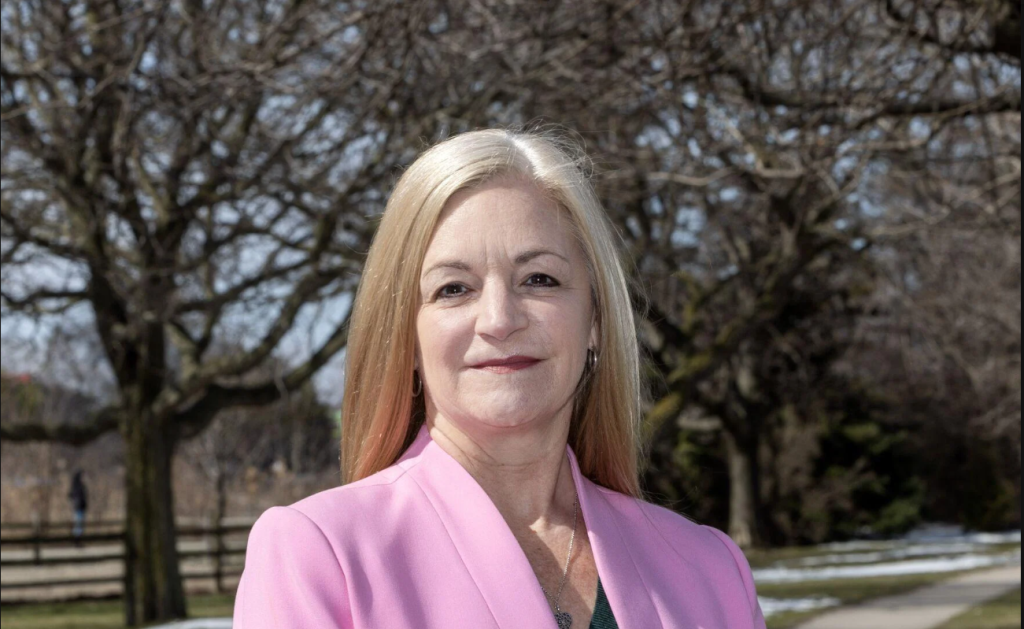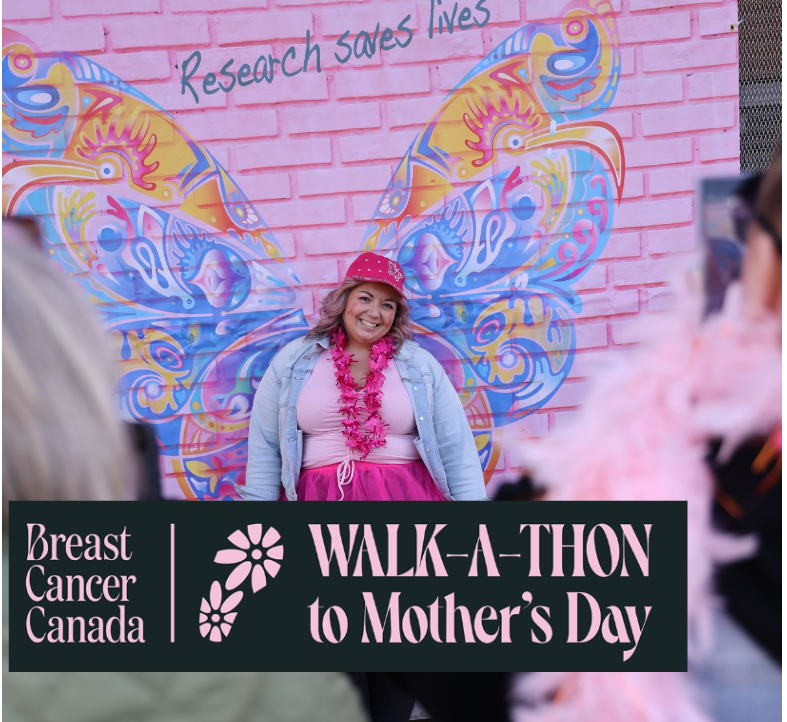 Dr. Alison Allan’s research lab is on the 4th floor of the London Health Sciences Centre (LHSC). The lab is a realm of true science where Dr. Allan investigates the process of metastasis, which occurs when cancer cells spread from the primary tumor to other parts of the body. Breast cancer is a special focus of Dr. Allan’s research program.
Dr. Alison Allan’s research lab is on the 4th floor of the London Health Sciences Centre (LHSC). The lab is a realm of true science where Dr. Allan investigates the process of metastasis, which occurs when cancer cells spread from the primary tumor to other parts of the body. Breast cancer is a special focus of Dr. Allan’s research program.
But when she goes down two floors, there is a cancer care facility full of patients who are undergoing cancer treatment. These are real patients in real clinical areas, and Dr. Allan finds the setting of her workplace inspiring, where cancer research and clinical care take place together.
“When I came to LHSC to do my post-doc, I began to work with Dr. Ann Chambers, who is an international expert in metastasis and breast cancer specifically. Our Translational Breast Cancer Research Unit, which was founded in partnership with the Breast Cancer Society of Canada, provides an environment where researchers can interact with physicians and patients. I have exposure to patients every day. That is what motivated me to stay in breast cancer research and still motivates me every day,” says Dr. Allan.
Although the survival rate of breast cancer is improving, the disease is still the leading cause of cancer death among women worldwide. Dr. Allan explains that metastasis is the most critical part of cancer because most patients do not die of their primary tumor. They usually die of metastatic disease.
“Unfortunately, even if breast cancer has been diagnosed in the early stage and the patient has successfully undergone surgery and other treatments, the cancer cells may escape from the primary tumor and move into the bloodstream. They can circulate throughout the body and invade distant organs like the lungs, the liver, the bones and others. This is what kills 80% of cancer patients.”
The lung is one of the organs to which breast cancer, especially the most aggressive types like triple-negative and HER2-positive, tends to spread. Why does this happen? Based on Dr. Allan’s team findings, some aggressive breast cancer cells express a protein called CD44 on their cell surface. These cells are particularly prone to travel through the bloodstream, reach the lung, interact with lung-specific proteins and grow in the lung, forming new tumors.
CD44+ breast cancer cells and those specific proteins produced by the lung itself work together like hooks that cling to each other. What if you break their interaction? “We suggest that in this case we can reduce metastatic activity. In our lab, we have already identified five specific lung-derived proteins that interact directly with CD44+ breast cancer cells. We have studied the ways to disrupt their interactions and identified a set of targets that likely can block those five specific lung proteins. This approach, I believe, will help us develop new therapies for treating lung metastasis of breast cancer,” says Dr. Allan.
Recently, Dr. Allan and her team have received funding to start the pre-clinical drug development process. “We are working with Dr. Raimar Löbenberg at the Drug Development and Innovation Centre at the University of Alberta. He is a pharmacist with experience in producing inhalable drugs like those used to treat asthma and other respiratory diseases. He will be packaging the targets that we identified into this form, and then we will be testing how the inhaled drug delivery approach works. If it does work, this could lead to an effective and easy-to-use drug for reducing breast cancer metastasis in the future.”
How long will it take to finally obtain a working medication? “If everything goes perfectly, 8-10 years. It’s still long time. We are looking at how to treat the metastasis successfully, but also assessing the preventative capacity of our targets. We have very specific targets and deliver them specifically to the lung. I hope that it will result in more effectiveness and much less toxicity. The lower the toxicity, the more hope to use our future drug to prevent breast cancer metastasis in the lung, not only to treat it.”
Another direction of Dr. Allan’s research is developing blood-based biomarkers that will help in the early detection of metastasis and the assessment of how anti-cancer treatments work in patients with metastatic disease. “It looks like a regular blood test. Just 10 ml of blood. We are looking at viable tumor cells that are floating in the bloodstream. This is a version of the liquid biopsy technology, which has showed impressive results recently. Yet, we can analyze the whole cancer cells while the traditional liquid biopsy is looking for pieces of DNA from tumor cells. We have more prognostic and predictive options because we can recover the cancer cells and study them in the lab to figure whether they are more aggressive or whether they have changed their characteristics. It tells us a bit more about the disease in real time.”
“Time is the biggest challenge in breast cancer research,” argues Dr. Allan. “Every morning, I walk in the LHSC building and see cancer patients. Sometimes I see women my age with kids, and I feel how long things take in science. I feel urgency. I want things to go faster so that our work will be able to benefit more patients.”
Translational research – with its focus on the rapid movement of findings from the lab to patients – is a good option to accelerate progress, Dr. Allan believes. “This approach is widely known as ‘from bench to bedside’, but here in London we also like to think about the ‘bedside to bench’ direction. We talk a lot with clinical colleagues and listen to the problems they see in clinics with their patients. We then take their concerns and ideas back to the lab and see what we can do. It is a circular process rather than a directional one. It is a dialogue.”
Dr. Allan welcomes grad students in her research program. “We are training the next generation of breast cancer researchers in the framework of having the patients in the centre of the research. We may not be able to cure metastatic breast cancer, but we can make it a chronic disease. We can give patients a long, healthy, and productive life. Instead of dying young of breast cancer, patients will live a long and happy life surrounded by their children and grandchildren. Why not? I think this is a very realistic goal.”
Support researchers like Dr. Alison Allan and others by considering a donation to the Breast Cancer Society of Canada. Find out how you can help fund life-saving research, visit bcsc.ca/donate
Dr. Alison Allan’s story was transcribed from interviews conducted by BCSC volunteer
Natalia Mukhina – Health journalist, reporter and cancer research advocate
 Natalia Mukhina, MA in Health Studies, is a health journalist, reporter and cancer research advocate with a special focus on breast cancer. She is blogging on the up-to-date diagnostic and treatment opportunities, pharmaceutical developments, clinical trials, research methods, and medical advancements in breast cancer. Natalia participated in numerous breast cancer conferences including 18th Patient Advocate Program at 38th San Antonio Breast Cancer Symposium. She is a member of The Association of Health Care Journalists.
Natalia Mukhina, MA in Health Studies, is a health journalist, reporter and cancer research advocate with a special focus on breast cancer. She is blogging on the up-to-date diagnostic and treatment opportunities, pharmaceutical developments, clinical trials, research methods, and medical advancements in breast cancer. Natalia participated in numerous breast cancer conferences including 18th Patient Advocate Program at 38th San Antonio Breast Cancer Symposium. She is a member of The Association of Health Care Journalists.




